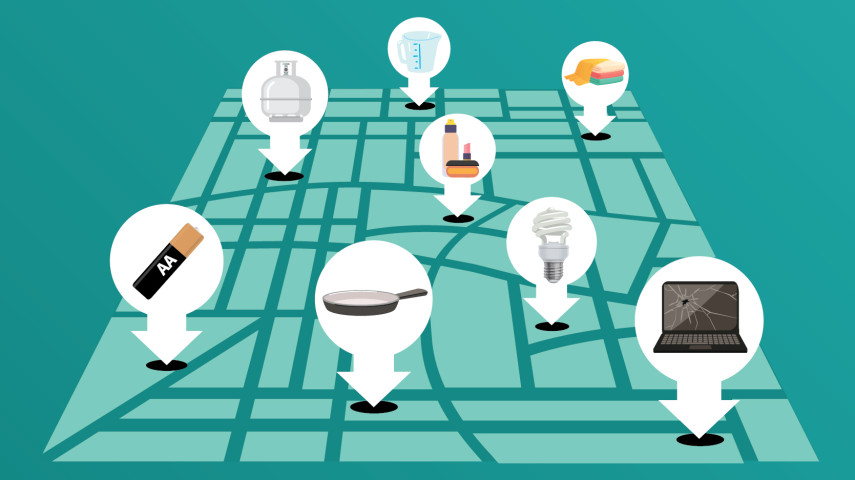Find out where to take stuff for free instead of putting it in your kerbside bins.

Download our alternative schemes brochure for Christchurch, [PDF, 2.1 MB] or Canterbury [PDF, 4.4 MB].
Can’t find what you’re looking for? Try searching yellow.co.nz(external link).
Never put batteries or anything that has a battery in your kerbside bin, as they can cause a fire.
Drop off at your EcoDrop Resource Recovery Centre, or Bunnings(external link) and Mitre 10(external link) collection points.
Visit the WasteMINZ website(external link) for a New Zealand-wide map.
Clothing made of good, reusable quality may be accepted by second-hand shops.
Items must be dry and free from rips, stains and fading.
- All e-waste, including any item where the battery cannot be easily removed such as electronic toothbrushes and laptops, can be dropped off for free at your local EcoDrop Resource Recovery Centre.(external link)
- They do not accept:
- Computer monitors smaller than 21 inches.
- Televisions such as plasma, CRT TV, glass screens, or televisions without an HDMI port.
- Noel Leeming Moorhouse(external link) or Warehouse Stationery South City(external link) also collect e-waste as part of the TechCollect NZ(external link) scheme.
- Donate laptops (with chargers) to Recycle A Device.(external link)
- Apple products can be recycled through Apple Recycling.(external link)
Takeback schemes TerraCycle(external link) , Kiehl’s(external link) and some cosmetic stores collect empty cosmetic containers, such as mascara tubes and wands, makeup, lipsticks, haircare and skincare products.
Clean and intact, curtains may be accepted by the Community Energy Action Curtain Bank(external link) to insulate homes.
Cartons require specialised processing that we aren’t set up for (oat, coconut, soy, long-life milk, juice boxes etc).
See saveBOARD NZ(external link) for drop-off locations. Cartons must be cleaned and cut open.
Take eyeglasses to Specsavers(external link) for reuse via the Lion’s scheme, Recycle for Sight(external link).
These are accepted at most second-hand shops if in a clean, reusable condition.
Never put gas bottles or canisters in your kerbside bins. Even if empty, they are hazardous.
Take to your EcoDrop Resource Recovery Centre(external link) for safe disposal.
We can’t recycle these as the Glass is different to the Glass in bottles and jars.
Drop them at your EcoDrop Resource Recovery Centre(external link) if they are not chipped or broken. If chipped or broken, put in your red bin.
Lids are too small and flat for our recycling machinery.
Lids are collected by the Caps & Lids Recycling Scheme(external link) across Christchurch, including at several New World (external link)supermarkets.
All containers must be lidless for recycling.
These can be hazardous when put in your kerbside bin.
Most Mitre 10(external link) stores collect all traditional lightbulbs for specialised recycling.
We can recycle food tins and drink cans only as all other metal items can cause breakdowns.
Take your other metal to your EcoDrop Resource Recovery Centre(external link), scrap metal dealer or second-hand shop.
Nurse Maude accepts donations of used mobility equipment. Donations will be cleaned, serviced, and redistributed in the community.
You can drop off at any Nurse Maude Hospice Shop and the Health and Mobility Shop at 87a Gasson Street, or call 027 498 2472 to arrange collection.
Phones with batteries can cause fires and must not go in any kerbside bin. Old mobile phones are collected at most phone stores.
RE: MOBILE
Run by the New Zealand Telecommunications Forum, RE:MOBILE offers an environmentally friendly way to recycle mobile phones.
There are two ways to make sure your phone gets to RE:MOBILE for safe recycling:
- Remove the battery first and take it to RE:MOBILE. Visit remobile.co.nz(external link) to find the one nearest you.
- Put your unwanted phone without any battery inside an envelope and send it to this FreePost address:
RE:MOBILE
Private Bag 208004
Highbrook
Auckland
2161
RE:MOBILE fits with Christchurch City Council's objective of making sure that as much recyclable material as possible is diverted away from the landfill.
The programme also helps to look after our waterways through a partnership with Sustainable Coastlines(external link). The award-winning New Zealand charity has partnered with RE:MOBILE to collect and recycle mobile phones.
The proceeds from this partnership help to plant trees alongside our waterways to restore our native animals, natural habitats, reduce sediment and improve water quality.
Terracycle (external link) collect many brands of packaging for recycling.
We can’t recycle these as they can’t be included in food-grade recycled plastics.
Bunnings(external link) and Mitre 10(external link) stores collect and recycle clean plant and seedling pots made of plastic ID 5.
The pots are shredded and melted into resin, which is then remoulded into new pots.
Polystyrene needs careful handling and special processing.
Most Mitre 10(external link) stores accept clean polystyrene with no food residue, dirt, stickers or glue.
The SPCA(external link), Dogwatch(external link) and veterinary clinics may accept these, depending on demand.
Soft plastics can get caught in our machinery and contaminate the recycling process.
There is no value in soft plastics compared to glass and aluminium, so we need manufacturers and big brands to contribute to the recycling costs.
Most New World(external link), Pak’nSave(external link), Warehouse(external link) and Woolworths(external link) stores collect clean, soft plastic items for recycling, such as bread bags, and packaging, chip packets, chocolate, lolly wrappers, courier bags and frozen food bags.
The Gear Up Ōtautahi(external link) programme accepts sports equipment in good condition to distribute to children so that they can participate in sports.
- Take tyres to your EcoDrop Resource Recovery Centre.(external link) Each customer can drop a maximum of 5 tyres for free at a time.
- Tyres must be clean and off rims.
- Tyre used for commercial purposes can not be dropped of for free.
- Bicycle tyres, tyres for non-motorised equipment such as prams, and pre cured rubber for retreads are not currently accepted
